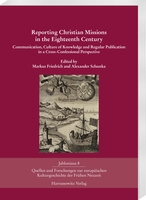|
|
more titles of the subject:
Download:
Please note: With adding digital Products to your cart
the payment will be handled via PayPal. The download will be provided after the payment is confirmed. Regular reporting on extra-European Christian missions was a distinctive feature of the early modern era, changing the worldviews of Europe and Europeans. The present collection of essays offers an innovative approach to this phenomenon by comparing different missionary publications from a cross-confessional perspective. It establishes a broader framework for understanding the organized and institutionalized transfers of knowledge from the missions to Europe. Contributions by various international specialists to such hallmarks of European Enlightenment as the Hallesche Berichte and the Jesuit Lettres Édifiantes along with less famous examples as the Circular Letters of the British missionary societies (SPCK, SPG) or the Gemeinnachrichten of the Moravian Brethren not only analyze the content but also the technologies and procedures employed to spread information.
The volume discusses the comparability of the different missionary periodicals from the vantage point of cultural history. It emphasizes the importance of regular publishing of missionary activities for the fashioning and strengthening of religious identities, against the backdrop of an evolving ‘Public Sphere’ in the Enlightenment and the formation of increasingly globalized cultures of knowledge in Europe. |
|||||||||||||||||||||||||||||||||||||||||






